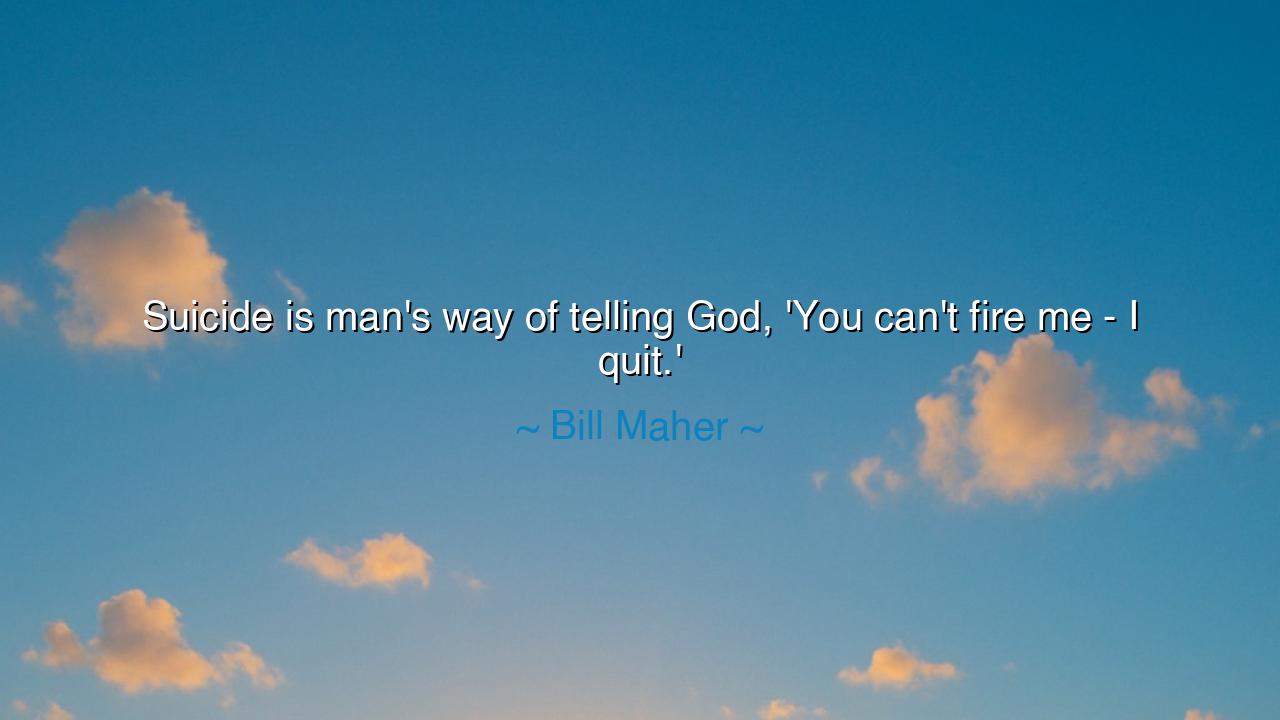
Suicide is man's way of telling God, 'You can't fire me - I






Hear now the dark yet piercing words of Bill Maher, who once said: “Suicide is man’s way of telling God, ‘You can’t fire me—I quit.’” Beneath the shock of these words lies a profound meditation on despair, rebellion, and the fragile covenant between humanity and the Divine. In his own sharp and ironic way, Maher captures the moment when a soul, overwhelmed by pain, seeks to end the contract of life itself. It is the voice of one who feels abandoned, who no longer wishes to endure the weight of existence, and who dares to tell God—the giver of life—that he will not wait to be released, but will choose his own end. Yet even in its bitterness, the quote reveals something sacred: that the struggle between man and God is not silence, but conversation—a cry of anguish that still acknowledges the One being cried out to.
The origin of this quote arises from Maher’s characteristically satirical approach to religion and philosophy. Known for his sharp wit and often controversial commentary, he sought through irony to expose human contradictions. Here, he reflects on the condition of despair that leads one to suicide, framing it as both a tragedy and a defiance. In the modern world—where faith is often uncertain and suffering feels senseless—many lose the meaning of their pain. Maher’s statement, while irreverent, is not without truth: it depicts the human heart in rebellion, the same rebellion that has burned within us since Eden—the desire to control our fate, even in death.
To say that “suicide is man’s way of telling God, ‘You can’t fire me—I quit’” is to lay bare the essence of hopelessness. It is the voice of a weary soul declaring independence from the Author of life. Yet what sounds like mockery may also be sorrow’s confession. The man who says “I quit” has not stopped believing in God—he has stopped believing that God still sees him. In that sense, Maher’s words reveal the paradox of despair: it is not the absence of belief, but the collapse of trust. When one feels abandoned, the temptation is to wrest control from Heaven’s hands, to end suffering by force of will. But this is a tragic illusion—for in rejecting life, one also rejects the very possibility of redemption that might have come tomorrow.
History is filled with souls who have walked to the edge of that abyss. Consider the story of Vincent van Gogh, the painter of light who lived in darkness. He saw the divine in every color and every field of wheat, yet the storms within him were unrelenting. His art, luminous and alive, was a dialogue with God—one brushstroke of hope for every tear of despair. And yet, when his spirit could no longer bear the weight of his torment, he ended his own life. His death was not a denial of God’s existence—it was a heartbreak born of silence, a cry that said, “I can no longer wait for deliverance.” In van Gogh’s story, as in Maher’s words, we glimpse the fragile tension between faith and anguish, between the Creator who gives life and the creature who can no longer hold it.
But there is another side to this truth. For every soul that quits, there are others who choose to fight, who find in their pain the seed of purpose. Consider Viktor Frankl, a man imprisoned in the horror of Auschwitz, surrounded by death and despair. There, stripped of everything, he discovered that meaning—not comfort, not freedom, but meaning—is what sustains the human soul. He wrote, “Those who have a ‘why’ to live can bear almost any ‘how.’” His faith was not blind, but defiant. Where others might have said “I quit,” he chose to endure, to live, and to teach that even in suffering, the human spirit reflects the image of God. Frankl’s life is the antidote to Maher’s irony—a reminder that though despair tempts us to surrender, endurance is the holier rebellion.
The wisdom hidden in Maher’s statement is this: life itself is a dialogue with God, even in our protest and pain. To live is to continue the conversation. To despair is human; to endure is divine. Those who face trials and tribulations without giving up are not denying their suffering—they are transforming it into faith. For every man who says “I quit,” there is another who whispers, “Not yet.” And it is that whisper, however faint, that keeps the world alive.
Therefore, let this teaching be passed down: when the weight of life becomes unbearable, do not end the story—turn the page. Seek the hand of another, seek the light that flickers still, even in the darkest night. For the heart that endures one more hour, one more dawn, may yet see how pain becomes purpose. Life is not a punishment—it is a gift, even when wrapped in sorrow. Do not tell God you quit; tell Him you’re still here. Tell Him you are waiting, broken but breathing, for the redemption He has promised.
And so, O listener of truth, remember the paradox in Bill Maher’s words: though they speak of defiance, they point to longing. For every soul that cries “I quit,” there is a part still reaching toward Heaven. If ever you find yourself in such darkness, know this—your life is not yours to discard, for you were breathed into being by the Divine, and He has not finished His work in you. Stay. Endure. Speak your pain, but stay. For no matter how long the night, dawn will come, and with it, a reason once more to live.






AAdministratorAdministrator
Welcome, honored guests. Please leave a comment, we will respond soon